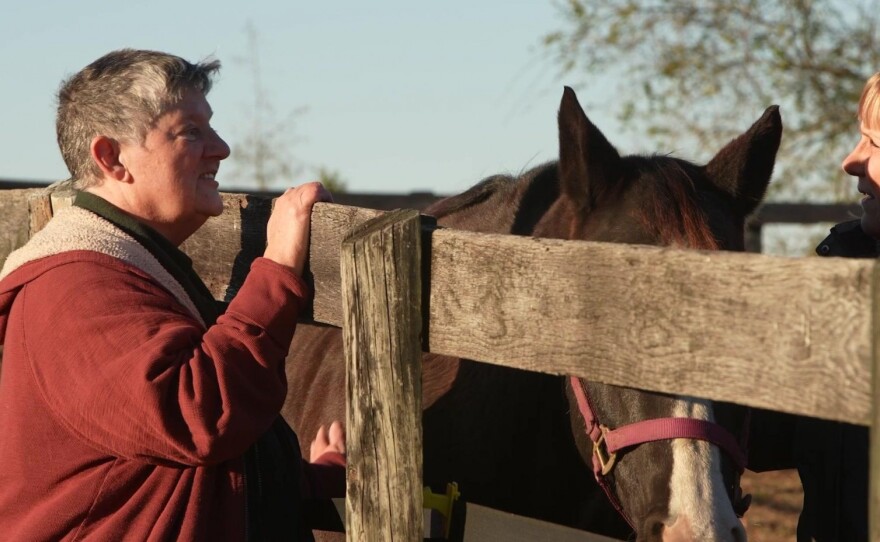Content warning: Be advised that this story contains sensitive subject matter about suicide and self-harm that may be difficult for some.
The suicide rate in the United States had been increasing. Up more than thirty percent from 2000 through 2018. Then, interestingly, the rate dropped for two years. But in 2021, it began rising again.
When it comes to gun deaths in America, suicides consistently outnumber murders.
For many people, suicide has been a topic that’s too painful to discuss. But that’s starting to change. Artists are singing about it. Organizations are offering helplines and training for intervention. The American Legion has just announced its Be the One campaign, meant to educate the public that anyone can be the one to prevent a suicide or improve another’s life. Even individuals who have attempted suicide are asking others to talk about it, to save lives.
Video Transcript
ANGIE MILES: American Legion riders come together to honor the fallen, strengthen their bonds, support one another and raise awareness about veterans' issues, including suicide.
JOHN POTTER: Because people don't understand that when you come back from any engagement anywhere, it's not over, it's still in your head. It's still in your body. So, it goes on and on. But I've lost several friends over the years due to PTSD. And it is very near and dear to my heart.
FREDDY MARKS: It hurts because they didn't ask for help. And that's all you have to do. Like the homeless, a lot of homeless veterans out there. They don't know who to call or where to reach out. And because they, you know, look like they've been on the streets, nobody's willing to help them.
ANGIE MILES: Statistics tell us that veterans are at great risk. And so are active-duty service members, Cliff Bauman decided in 2002 that he could no longer live with what felt like failure. The September 11th attack on the U.S. Pentagon had left the 33-year-old National Guardsman with nightmarish memories of a two-day search through the wreckage. And the sorrow of finding no one alive.
CLIFFORD BAUMAN: It was late at night, I was at my brother's house, and I had been drinking, I was feeling guilty and upset over all the thoughts of 9/11. And I just didn't want to deal with it no more. And so, I took 20 to 22 sleeping pills, wrote a note and lay down on my brother's couch.
ANGIE MILES: Post-traumatic stress, a sense of hopelessness, the pain of bullying, or abuse. These are some of the reasons suicide is a leading cause of death across all ages in America. Sylvia DeVoss was in her 30s When she decided to end her life,
SYLVIA DEVOSS: I went up into the mountains on the Blue Ridge Parkway and pulled over and pulled out my .38. I just remember thinking that this is the perfect place to end my life. Because at that point, I just felt that I was a menace to everyone. And I remember saying, “Dear God, please help me.” And my intent with that was for him to help me have the guts to pull the trigger. Because I had it right here at my temple.
ANGIE MILES: She recalls a childhood marked by fear and pain, including abuse by a male relative.
SYLVIA DEVOSS: He used to come in my bedroom, and, and do things sexually with me that was just horrible. And I'm pretty sure my dad was aware of it. I couldn't swear to that. My mom never seemed to be around which I find interesting. I'm not sure she could have done anything. Because my dad was extremely forceful. And, you know, I never saw him abuse her, except for verbally, and he would lash so hard that I would be scared for my mom.
I did talk about the abuse. And I remember people would not believe me, and it was pretty obvious that it really didn't matter what I said, you know, I had been branded a liar by my dad very effectively. And I'd run and hide in the woods for days and days and days. And I remember in fifth grade, I would there was a writing assignment. And I'm not quite sure what I had said in my paper that triggered somebody but my teacher just got up and grabbed me by the wrist and took me to the principal. And they called my dad. And it was a school psychologist involved. And all I remember is when we got home, my dad really just annihilated me. And so, I just learned not to say anything.
ANGIE MILES: Silvia describes feeling ostracized and misunderstood. Growing up as a Jehovah's Witness and being excluded by both black and white people she thought were her friends. All that early hurt, she says, made suicide feel like the best solution.
SYLVIA DEVOSS: And when I pulled the trigger, it pulled the nozzle right in front of me. And so it went off in front of me instead of in me. And I hit the ground. And I just remember when I realized that I was not hit. I was so angry. And I was angry at God because he helped me in the wrong way. You know, and it was like, what do I do at this point?
ANGIE MILES: What she did was throw away the gun, come down from the mountain and call for help.
SYLVIA DEVOSS: And I'm so beyond grateful that I missed and if people could just get through that moment. It's literally just a moment in time. That if you could just get that temporary, shake up in your head that this is really not worth it. You know, your life can become whatever you want it to be.
ANGIE MILES: Her life today is about art and service. She's an avid photographic artist, a creator of workshops on healing and spiritual growth, a mother, a grandmother, a person who lives to help others.
SYLVIA DEVOSS: So, I totally forgive. In fact, I'm actually grateful for my past. And I say that I wouldn't recommend it to anyone. But I say that because I don't know who I would be. If it weren't for all the weird stuff that happened to me as a kid, all the abuse, all the people that didn't, they didn't count me in for anything. You know, I have very good friends that you would never know also suffered a lot of abuse. Because if you knew who they were, you’d go “No way.” And that's the kind of person I want to be that people see me for who I am now. And that I can help with, you know, things you're going through. But I'm not there anymore. I'm just not. Thankfully.
ANGIE MILES: The same is true for Cliff Bauman. After he overdosed his brother found him unconscious, and got him to a hospital. Then Bauman says he got honest and got help. His life's work now is helping others to fully live.
CLIFF BAUMAN: I have to believe that I survived my suicide attempt for a reason. And this is why I do what I do. This is why I started the Mental Health Warrior Podcast. This is why I do my speaking events and why I do my book. But I understand what it's like not to want to see the dark. I understand what it's like not to want to see the daylight. I understand what it's like not to want to open your eyes in the morning. But I also understand the opposite of it. And how great life can be. I wouldn't have my two boys. I wouldn't have my wife who now we've been together for 15 years. I wouldn't have any of that. Once you learn to control that if you have PTSD, to have mental health issues, and learn with good tools on how to get past it. Life is so much better and so great.








